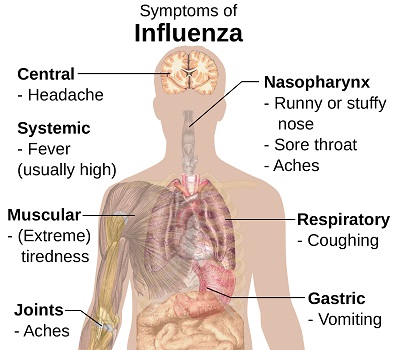Influenza Symptoms

If you are experiencing influenza symptoms, you should see your health care provider to find out if you have the condition. Infection with the flu is contagious and can result in pneumonia, sinus infections, and dehydration. If you have a history of health issues, the illness may also worsen these conditions. Young children may also feel ill in the stomach, have loose stools, and have a fever. You should avoid close contact with sick people until you’ve recovered from the illness.
Afebrile respiratory illnesses and systemic diseases are the most common influenza symptoms. The illness can be contagious and can lead to pneumonia. Early signs of the illness include watery, red, and plethoric eyes, and a dry cough. The convalescent period may last four to eight days. Patients will also have a malaise and dry cough. While it’s important to get proper rest and fluids, there are also a few ways to treat your influenza symptoms at home.
If you notice flu symptoms, it’s important to seek medical attention right away. You’re not alone if you have them. In addition to coughing and sore throat, flu can also cause muscle aches and headaches. Even your daily activities can be affected by the infection. Remember that the best treatment is prevention. Take the appropriate medicine as soon as possible. You can start taking antiviral medicine as early as possible. This should help reduce your flu symptoms.
The incubation period for influenza is two to five days. Healthy adults can infect others for up to five days before they have symptoms. In children and people with weakened immune systems, this incubation period can be longer than one week. The cough may last up to two weeks. The duration of incubation is usually between a few days and a couple of weeks. This is why it is essential to take care of yourself and your loved ones as soon as you can.
The symptoms of influenza may be mild or severe. The virus can spread through droplets released from an infected person’s nose and throat. Infected individuals can pass the virus to other people by touching surfaces with their mouth or nose. The virus also can be transmitted through the air. Acute influenza can cause serious complications, including heart problems and chronic lung diseases. The symptoms of influenza can be mild or severe. Some people may have only one or two of these symptoms.
Symptoms of influenza often begin suddenly and are systemic. Some people may experience true chills and a fever sensation. Others may experience severe myalgia and malaise. While the symptoms are generally mild in older people, they can be life-threatening and result in hospitalization or even death. Infection with influenza may cause a number of complications, including pneumonia. A high fever can lead to serious complications. If you have a compromised immune system, you should seek medical attention as soon as possible to ensure the safety of your loved ones.
Acute influenza can cause serious complications, including a prolonged illness and death.
Flu symptoms vary depending on how you contracted the virus, but they usually last one to three days. The cough may last two weeks or more. Some other flu-related complaints include sore throat, chest pain, and dry cough. It is important to seek medical attention if you have severe flu symptoms. If you are at risk of an acute flu infection, stay home until you are well and get useful health information online ticketbox.co.th.
A flu diagnosis is essential to ensure the health of your loved ones. During the flu, your doctor may prescribe antiviral medications to help you recover faster. While you are infected with the virus, you will need to stay at home until your flu symptoms are gone. If you develop an infection, seek medical attention and follow your doctor’s advice. The most important thing to do is to rest. Fever, sore throat and body aches are common flu symptoms.
The flu is a contagious disease that can cause serious complications. If you’re exposed to someone with influenza, you may be exposed to the virus by touching them. The person with the flu can spread the virus to others by coughing and sneezing, and the droplets from their throat can be infectious to you. The virus may also be spread through contaminated objects. Infected people may also spread the disease to others through contaminated surfaces or touch their noses.

